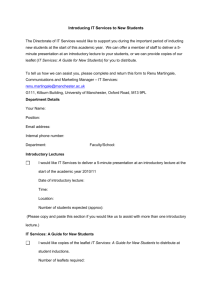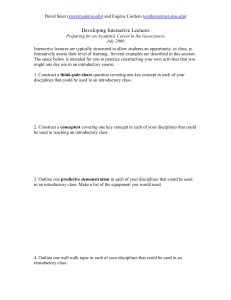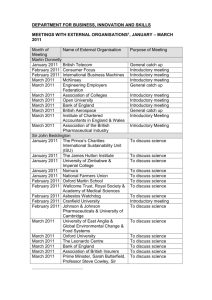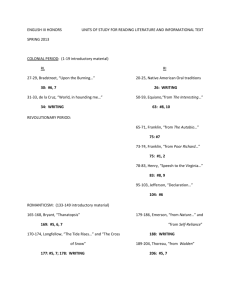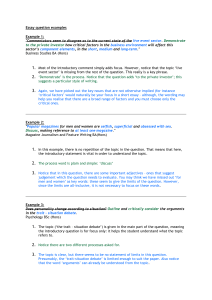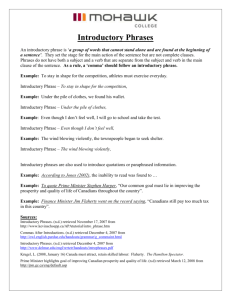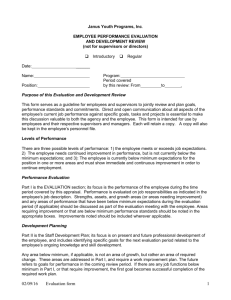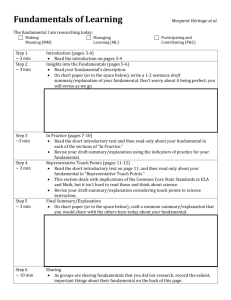SupAuthGuide
advertisement
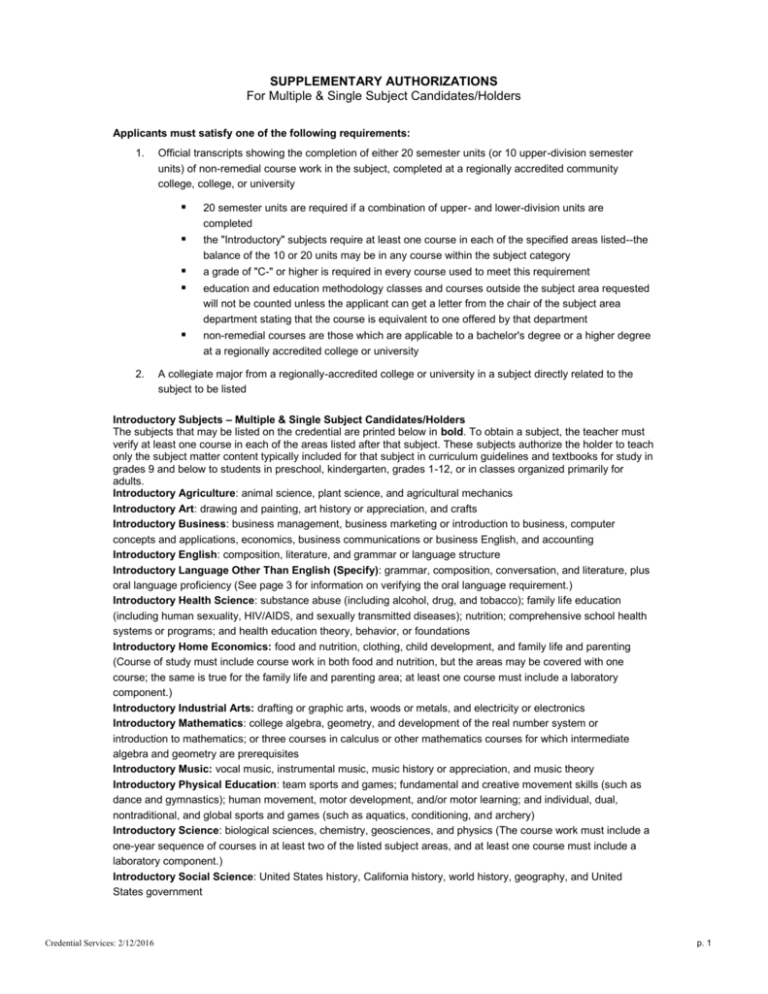
SUPPLEMENTARY AUTHORIZATIONS For Multiple & Single Subject Candidates/Holders Applicants must satisfy one of the following requirements: 1. 2. Official transcripts showing the completion of either 20 semester units (or 10 upper-division semester units) of non-remedial course work in the subject, completed at a regionally accredited community college, college, or university 20 semester units are required if a combination of upper- and lower-division units are completed the "Introductory" subjects require at least one course in each of the specified areas listed--the balance of the 10 or 20 units may be in any course within the subject category a grade of "C-" or higher is required in every course used to meet this requirement non-remedial courses are those which are applicable to a bachelor's degree or a higher degree at a regionally accredited college or university education and education methodology classes and courses outside the subject area requested will not be counted unless the applicant can get a letter from the chair of the subject area department stating that the course is equivalent to one offered by that department A collegiate major from a regionally-accredited college or university in a subject directly related to the subject to be listed Introductory Subjects – Multiple & Single Subject Candidates/Holders The subjects that may be listed on the credential are printed below in bold. To obtain a subject, the teacher must verify at least one course in each of the areas listed after that subject. These subjects authorize the holder to teach only the subject matter content typically included for that subject in curriculum guidelines and textbooks for study in grades 9 and below to students in preschool, kindergarten, grades 1-12, or in classes organized primarily for adults. Introductory Agriculture: animal science, plant science, and agricultural mechanics Introductory Art: drawing and painting, art history or appreciation, and crafts Introductory Business: business management, business marketing or introduction to business, computer concepts and applications, economics, business communications or business English, and accounting Introductory English: composition, literature, and grammar or language structure Introductory Language Other Than English (Specify): grammar, composition, conversation, and literature, plus oral language proficiency (See page 3 for information on verifying the oral language requirement.) Introductory Health Science: substance abuse (including alcohol, drug, and tobacco); family life education (including human sexuality, HIV/AIDS, and sexually transmitted diseases); nutrition; comprehensive school health systems or programs; and health education theory, behavior, or foundations Introductory Home Economics: food and nutrition, clothing, child development, and family life and parenting (Course of study must include course work in both food and nutrition, but the areas may be covered with one course; the same is true for the family life and parenting area; at least one course must include a laboratory component.) Introductory Industrial Arts: drafting or graphic arts, woods or metals, and electricity or electronics Introductory Mathematics: college algebra, geometry, and development of the real number system or introduction to mathematics; or three courses in calculus or other mathematics courses for which intermediate algebra and geometry are prerequisites Introductory Music: vocal music, instrumental music, music history or appreciation, and music theory Introductory Physical Education: team sports and games; fundamental and creative movement skills (such as dance and gymnastics); human movement, motor development, and/or motor learning; and individual, dual, nontraditional, and global sports and games (such as aquatics, conditioning, and archery) Introductory Science: biological sciences, chemistry, geosciences, and physics (The course work must include a one-year sequence of courses in at least two of the listed subject areas, and at least one course must include a laboratory component.) Introductory Social Science: United States history, California history, world history, geography, and United States government Credential Services: 2/12/2016 p. 1 Specific Subjects – Single Subject Candidates/Holders Only These subjects authorize the holder to teach the specific subject at any grade level (preschool, K-12 inclusive, and classes organized primarily for adults). Accounting (including Finance) Agricultural Mechanics Animal Science Anthropology Auto Mechanics Biological Sciences † Chemistry † Child Development (Home Economics) †† Clothing and Textiles (Home Economics) †† Comparative Political Systems and International Relations Computer Concepts and Applications Consumer Education (Home Economics) Crafts, including Jewelry and Ceramics (Art) Dance Drafting Drama Economics Economic and Consumer Education Electronics English Composition Family Life and Parenting (Home Economics) Family Life Education including Drug, Alcohol and Tobacco Use Prevention (Health Science) ††† Food and Nutrition (Home Economics) †† Forestry and Horticulture Geography Geosciences † Graphic Arts Industrial Crafts and Plastics Instrumental Music Interior Design (Home Economics) †† Journalism Literature Marketing/Entrepreneurship Metals (Industrial Arts) Office Technologies including Word Processing and Business Communications Ornamental Horticulture Painting and Drawing Photography Physics † Plant Science Plastics (Industrial Arts) Psychology Sociology Speech US Government and US Civics US History and California History Vocal Music Woods (Industrial Arts) World History † The specific subjects in science must include the components for that area as shown below. At least one course must include a laboratory component. Biological Sciences: Molecular and Cellular Biology, Biology of Organisms, and Evolution Chemistry: Structure and Stability, and Chemical Reactions Geosciences: Astronomy, Geology, Meteorology, and Oceanography Physics: Energy-Mechanics, Energy-Heat, Energy-Electricity & Magnetism, Wave Motion, and Atomic & Nuclear Physics †† Subjects marked must include a laboratory component. ††† Family Life Education, including Drug, Alcohol, and Tobacco Use Prevention (Health Science), must include the following components: Sexually Transmitted Diseases including HIV/AIDS, Human Development and Human Sexuality, Parenting Education, Violence Prevention, and Drug, Alcohol, and Tobacco Use, Prevention, and Cessation. Oral Language Proficiency Oral language proficiency in the language to be listed on the credential may be verified by one of the following: 1. 2. 3. Credential Services: 2/12/2016 Pass the speaking and listening sections of Test 6 of the Crosscultural Language and Academic Development/Bilingual Crosscultural Language and Academic Development (CLAD/BCLAD) Examinations Obtain a letter from the chair of the Language Department of a regionally-accredited college or university stating that the applicant's oral proficiency is equivalent to that of a person with a bachelor's degree with a major in that language Obtain a letter from the authorized person at a college or university that has an approved Bilingual Crosscultural Language and Academic Development (BCLAD) Emphasis Credential Program stating that the applicant's proficiency in that language is equivalent to the level required to complete that program p. 2
